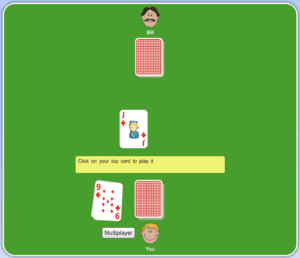I played War for this assignment, a card game that is targeted at casual gamers who enjoy simple, luck-based card games. This does not have a specific creator: it is a traditional card game that has been played for generations and passed down through various cultures. War is typically played with a physical deck of standard playing cards but can also be found on various digital platforms, including mobile apps and online gaming websites. (Figure 1)
The combination of randomness and near misses in War can put people at risk of addiction. Specifically, War relies on a misrepresentation of odds to trick the player’s perceptual system and encourage persistence. Each round of War involves both players turning up a card, with the player having the higher card winning both cards. Despite the player having no control over which card is played (the cards are dealt randomly and cannot be seen or chosen beforehand), players often develop a psychological perception that they can predict or influence future outcomes based on past results. This belief leads to a persistence that mirrors the addictive behaviors seen in gambling. When a player wins a round, they experience a thrill and a sense of achievement, even though it was purely based on chance. Conversely, when they lose, the frustration is often countered by the belief that their luck will soon change, encouraging them to keep playing. Therefore, the player feels that every loss is a near miss, which dangerously encourages them to keep playing until they can win again. This cycle of intermittent reinforcement, where wins are unpredictable but highly rewarding, is a powerful driver of addictive behavior.
War shares similarities with other games of chance, such as slot machines, poker or blackjack. However, it is different in that it is a much more simple game that creates direct head-to-head competition. Unlike poker or blackjack, which require a combination of skill, strategy, and chance, War is based purely on luck, with no element of skill influencing the outcome. This randomness can significantly impact player behavior, as it creates an engaging experience for the player through the anticipation of uncertain outcomes. Specifically, the randomness ensures that each round is unique, maintaining a constant sense of excitement and possibility. This ensures that players remain hooked by the ever-changing prospects of winning, similar to how random number generators in gambling machines maintain player interest by making each play feel fresh and full of potential. This continuous cycle of unpredictability and the excitement it generates can lead to addictive behavior, as players become increasingly absorbed in the game, driven by the thrill of chance.
In short, the combination of randomness and near misses in War can put people at risk of addiction by misrepresenting odds and tricking the player’s perceptual system. The game’s simple higher/lower mechanic leads players to a belief that future outcomes can be predicted. This perception creates persistence similar to gambling addiction, as wins provide a thrill and losses foster a belief that luck will change. Since War solely relies on luck, it can significantly impact player behavior by maintaining excitement through unpredictable outcomes.




